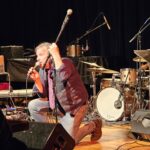Photos by Jennifer Kantor
Our ship has docked in Cozamel but Jen and I opt to stay on board. For me, I figure this might be an opportune time to connect with some of the performers and get my inner selfie king on.
Breakfast in the main dining room yields handshakes with Nat Silven (Steve Hackett) and Yes frontman Jon Davison. I’ve already eaten, but my favorite spot on our ship thus far has been the Windjammer Café on Floor 11. Those who eat there have the greatest potential to encounter their prog heroes.
Within this area, I snag selfies with bass master Tony Levin (King Crimson, Peter Gabriel, Stick Men), Kansas frontman Ronnie Platt, Yes bassist Billy Sherwood, and Neal Morse.
After cashing in our spa voucher, and being kneaded vigorously with a bamboo pole, I head up to the Centrum to see Eddie Trunk interview several Kansas members. Over the course of an hour, they’ll discuss lineup changes, the departure of former lead vocalist Steve Walsh, and thoughts about their own chances for the RRHoF.
Walsh, according to Kansas guitarist Rich Williams, has retired due to vocal problems. As Williams puts it, Walsh “poured his guts out on every stage for 40 years. He earned the right to say, ‘Guys, I’ve had enough.’” Williams makes sure to add that Walsh is “one of the best rock ‘n’ roll singers of all time.”
In terms of Kansas’ future chances for being enshrined in Cleveland, Williams says, “I’m a realist and I don’t let things like that bother me … For our fans who want it so bad; for my grandkids, that would mean a lot to me. If we get there, great. It’ll be awesome. But I won’t lose a second of sleep over it.”
While Jen takes time to bask in the sunlight, I soon head back to the Windjammer, where I just miss a selfie opportunity with Mike Portnoy. However, when one musician says no, another allows you to sit at their table. In my case, Patrick Moraz and I engage in a 15-minute chat. After signing my vinyl copy of his Out in the Sun solo album, he proceeds to explain the music he made with Yes, his recording process with the band, and the worlds of instruments and technology. I keep up as best I can but mainly listen to avoid saying something stupid and getting banished from his table entirely.
A walk back to the Roger Dean gallery has me passing through the Viking Crown lounge, also on Floor 13. I’m greeted by the sounds of jazz piano, played by none other than Focus founder and multi-instrumentalist Thijs van Leer. As he vamps away, I sneak around to the front of his piano to take some pictures, hoping I get him in mid-whistle (I do).
His music ultimately wafts into the gallery – this time he tackles Bach’s “Air on the G String.”
***

The unexpected highlight of my day comes from learning I’ve snagged a 10-minute interview with Steve Hackett set for 5:30 pm at the Windjammer. I arrive shortly after 5 pm and sure enough, there he is, in T-shirt and shorts, ready to talk with me. I try to stay cool but it’s hard not to sweat when you’re sitting across from one of your musical gods and can see how long the fingernails on his right hand are.
Hackett is friendly, articulate and a genuine pleasure to talk to. What’s supposed to last 10 minutes ultimately stretches to nearly 40 as I ask about his new album The Night Siren; the 40th anniversary of his last album with Genesis, Wind and Wuthering; his friendship with the late John Wetton; and his impetus for including both Steve Walsh and Richie Havens (!) as vocalists on his Please Don’t Touch! album, which itself turns 40 next year.
“When I was doing Please Don’t Touch!, I didn’t consider myself to be a vocalist,” Hackett tells me. “In a way, I think both Steve Walsh and Richie Havens, in their separate ways, were trying to convince me of the idea of trying to sing. Steve Walsh said to me, ‘You’ve got a good voice. It’s just untrained.’ Richie Havens said, ‘The most beautiful instrument in the world is the human voice.’ I said to him at the time, ‘Yours maybe, not mine.’ Since then, on just about every album I’ve tried to push the envelope in terms of just singing.”
Hackett shares some marvelous insights with me about the recording process with Havens, which I’m opting to save for a future Vinyl Confessions. Trust me, it’ll be worth the wait. As a quick snippet, I can tell you that Hackett told me he and his Genesis bandmates “were all huge fans” of Havens.
“He was a guy who only really ever needed an acoustic guitar because the power of his voice was extraordinary,” he said. “Definitely a message of peace from him. Loved working with him.” While our interview is underway, cruise speakers are playing Hackett’s solo track “Ace of Wands” overhead. Talk about fate intervening!
Hackett tells me Wind and Wuthering is a “strong album” and that during its recording he was able to better influence the band by including incorporating nylon guitar and other diverse instrumentation, as well as social commentary into the recording process (aka “Blood on the Rooftops”).
“I think it’s a very good album,” he says. “I wanted that album to have a trademark nylon sound in the way Genesis had trademark 12-string sounds previously.” Hackett spends a few minutes explaining to me how he came into his own as a singer. I ask that considering the breadth of his solo output, if he ever considered stepping up to the mike at all while in Genesis.
“It was not something that I felt I could do with Genesis,” he says. “I just didn’t evolve at the same speed. My concerns were to come up with good guitar parts, leave the singing to others. Since then, something happened and I realized that I had a need to sing.
“I can’t stress this enough for people who consider themselves to be ‘non-singers:’ it’s as much about psychology and understanding the sound that you make and not rejecting the sound that you make,” he adds. “It’s quite a difficult thing. It was an obsession of mine for many, many years.”
Hackett also refuses to refer to John Wetton in the past tense: “I feel John is still around. I look forward to seeing John again at some point and I sincerely hope he’s received his much-deserved promotion in spirit.”
In talking about his personal and musical brotherhood with Wetton, Hackett shares two surprising tidbits: he came close to forming a band with Wetton, Rick Wakeman and Carl Palmer, and he was invited by Wetton to join his group U.K. after the release of their debut album.
“I said I didn’t think that I would technically be up to that at that time,” Hackett says. “Plus, I was in the first flush of doing solo stuff and I was worried about jumping out of the frying pan and into the fire.”
Despite his departure from Genesis, Hackett harbors great affection for the songs he created with his former bandmates. His live sets typically encompass a 50-50 split between his solo output and Genesis tracks from the 1971 to 1976 era.
“Tony Banks said, ‘You’re keeping the legacy alive,’ so for me, it’s a great pleasure to bring these songs to people in a way the second or third time around,” he says. “The true owners of these songs are not the people who wrote them. It’s the audience.”
We conclude the interview by discussing The Night Siren, which will be released next month. This will undoubtedly be “the most worldly” of all Hackett solo albums given that it features musicians spanning the globe. Tackling strong subject matter, including refugees and “calamitous politics,” Hackett’s intention for the album is to achieve a kind of global harmony currently lacking thanks to modern day injustices and politics.
“In a way, the idea of unity perhaps is a far-off dream but somebody’s got to dream it,” he says.
We wrap things up but the die-hard fan in me can’t resist. I ask if Hackett can sign my vinyl copy of Spectral Mornings and if I can take a picture with him. He obliges me with both.
“I hope we can speak again,” I tell him as we say our goodbyes.
“I’m sure we will,” he responds.
The thought I have for the remainder of the day, even as Jen and I have a steak dinner and then check out Tony Levin’s group Stick Men at the ship’s Colony Club is “Did all that really just happen?”
It did, and believe me when I tell you it was truly a bucket list experience.
—Ira Kantor













Be the first to comment!